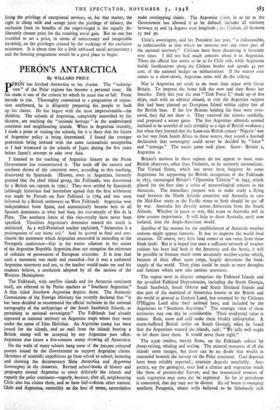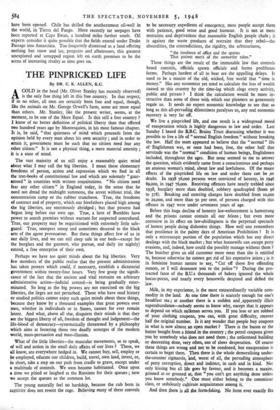PERON'S ANTARCTICA
By WILLARD PRICE
pERON has hitched Antarctica to his chariot. The " redemp- tion" of the Polar regions has become a personal issue. He has made it one of the criteria by which he must rise or fall. Peron intends to rise. Thoroughly committed to a programme of expan- sion southward, he is diligently preparing his people to back up his claims. He has begun with the most impressionable—the children. The schools of Argentina, completely controlled by the dictator, are teaching the "national heritage" in the undeveloped continent and neighbouring islands. When in Argentina recently, I made a point of visiting the schools, for it is there that the future of Argentine policy is being determined. I found the younger generation being imbued with the same nationalistic xenophobia as I had witnessed in the schools of Japan during the five years before Japan's attempt to take over Asia.
I listened to the teaching of Argentine history as the Peron Government has reconstructed it. The lands off the eastern and southern shores of the continent were, according to this teaching, discovered by Spaniards. (History, even in Argentina, formerly granted that the chief island group, the Falklands, was discovered by a British sea captain in 1592.) They were settled by Spaniards (although historians had heretofore agreed that the first settlement was made by French on East Falkland in 1764 and was soon followed by a British settlement on West Falkland). Argentina won independence from Spain, and automatically became heir to all Spanish dominions in what had been the vice-royalty of Rio de la Plata. The southern limits of this vice-royalty have never been specified. Therefore Argentina's dominion toward the south is unlimited. As a well-Peronised teacher explained, "Antarctica is a prolongation of our home soil." And he quoted as final and con- clusive the statement which Argentina succeeded in recording at the Petropolis conference—that in the waters adjacent to the coasts of the Argentine Republic Argentina does not recognise the existence of colonies or possessions of European countries. It is true that such a statement was made and recorded—but it was a unilateral Argentine statement and not, as the teacher would make me and his students believe, a resolution adopted by all the nations of the Western Hemisphere.
The Falklands, with satellite islands and the Antarctic continent itself, are referred to by Peron teachers as " Southern Argentina." A film titled Southern Argentin.a depicts them. The Antarctic Commission of the Foreign Ministry has recently declared that "it has been decided to recommend the official inclusion in the national cartography of the archipelago of the South Sandwich Islands, as pertaining to national sovereignty." The Falklands had already appeared as national territory on Argentine maps where they went under the name of Islas Malvinas. An Argentine stamp has been issued for the islands, and no mail from the islands bearing a British stamp will be accepted by any Argentine post office. Argentina also issues a five-centavo stamp showing all Antarctica.
On the walls of many schools hang some of the 200,000 coloured posters issued by the Government to support Argentine claims. Members of scientific expeditions go from school to school, lecturing and showing the documentary films Antarctica and Argentine Sovereignty in the Antarctic. Revised school-books of history and geography extend Argentina to cover definitely the islands and vaguely the polar continent—vaguely, because, after all, neighbouring Chile also has claims there, and so have half-a-dozen other nations. Chile and Argentina, ostensibly on the best of terms, nevertheless make overlapping claims. The Argentine c:aim, in so far as the Government has allowed it to be defined, includes all territory between 25 and 74 degrees west longitude ; the Chilean, all between 53 and 9o.
Chile's sovereignty, said her President last year, " is indiscussible, as indiscussible as that which we exercise over any other part of the national territory." Chileans have been discussing it fervently ever since. I did not find much concern about it in Argentina. There the official line seems to be to let Chile talk, while Argentina builds fortifications along the Chilean border and spends 45 per cent. of the national budget on militarisation. If the matter ever comes to a show-down, Argentine arms will do the talking.
Nor is Argentina yet ready to do more than argue with Great Britain. To impress the home folk she now and then flexes her muscles. Early this year she sent " Task Force I," made up of five ships, each with an admiral aboard, to visit the Argentine outpost that had been planted on Deception Island within eighty feet of the British base. If the few Britons holding the base were over- awed, they did not show it. They received the visitors cordially, and proposed a soccer game. The five Argentine admirals seemed inclined to be scornful of such triviality as a sign of British weakness ; but when they learned that the 8,000-ton British cruiser ' Nigeria ' was on her way from South Africa to these waters, they issued a hurried declaration that sovereignty could never be decided by " force" and " tonnage." The soccer game took place. Score: Britain r, Argentina o.
Britain's motives in these regions do not appear to most non- British observers, other than Peronists, to be narrowly nationalistic. The United States, which has never been forgiven by some Argentines for supporting the British occupation of the Falklands in 1833, encouraged Britain's " Operation Tabarin" in 1943, which placed for the first time a series of meteorological stations in the Antarctic. The immediate purpose was to make ready a flying road between the North Atlantic countries and Australia in case the Mid-East route or the Pacific route or both should be cut off by war. Australia lies directly across Antarctica from the South Atlantic. Whether in peace or war, this route to Australia will in time assume importance. It will help to draw Australia, until now isolated, into the Anglo-American world.
Another of the reasons for the establishment of Antarctic weather stations might appear fantastic. It was to improve the world food situation. Of course, very little food comes or can come from these bleak lands. But it is hoped that once a sufficient network of weather stations has been laid both in the Antarctic and the Arctic, it will be possible to forecast much more accurately weather-cycles which, because of their effect upon crops, largely determine the food- supply of the world. Then plans could be made to meet droughts and famines which now take nations unawares.
The region most in dispute comprises the Falkland Islands and the so-called Falkland Dependencies, including the South Georgia, South Sandwich, South Orkney and South Shetland Islands and that part of the mainland of Antarctica known to the British and the world in general as Graham Land, but renamed by the Chileans O'Higgins Land after their national hero, and included by the Argentines in " Southern Argentina." The strategic value of these territories may one day be considerable. Their residential value is minus. Rain, snow and cold make them bleakly inliospitable. A storm-buffeted British settler on South Georgia, when he heard that the Argentines wanted the islands, said : " We jolly well ought to let them have them. It would serve them right."
The 2,50o settlers, mostly Scots, on the Falklands subsist by sheep-raising, whaling and sealing. The mineral resources of all the islands seem meagre, but there can be no doubt that wealth is concealed beneath the ice-cap on the Polar continent. Coal deposits have been reliably reported ; uranium deposits unreliably. Ant- arctica, say the geologists, once had a climate and vegetation much like those of present-day Europe, and the transmuted remains of such vegetation may some day be exploited. So far as petroleum is concerned, that day may not be distant. An oil boom is sweeping southern Patagonia, where wells believed to be fabulously rich
have been opened. Chile has drilled the southernmost oil-well in the world, in Tierra del Fuego. More recently tar seepages have been reported at Cape Ewan, a hundred miles farther south. Oil experts consider it quite possible that the fields extend under Drake Passage into Antarctica. Too frequently dismissed as a land offering nothing but snow and ice, penguins and albatrosses, this greatest unexplored and untapped region left on earth promises to be the scene of increasing rivalry as time goes on.











































 Previous page
Previous page